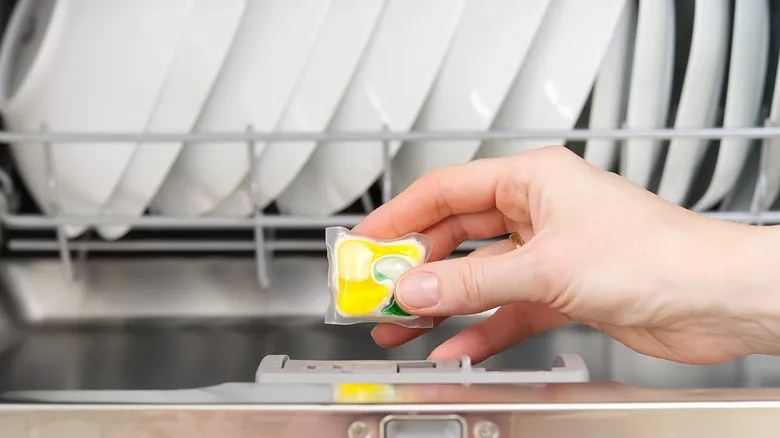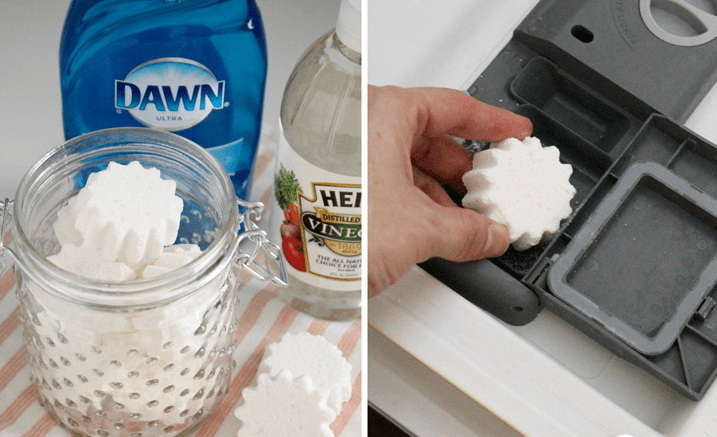Dongguan UFine Daily Chemical Co.,Ltd.
- All
- Product Name
- Product Keyword
- Product Model
- Product Summary
- Product Description
- Multi Field Search
Views: 222 Author: Tomorrow Publish Time: 11-20-2025 Origin: Site











Content Menu
● Can You Still Use a Ripped Dishwasher Pod?
● How to Use a Torn Dishwasher Pod Safely
● When Should You Discard a Ripped Pod?
● Proper Storage to Avoid Pod Damage
● Safety Considerations and Risks
● Alternative Dishwasher Detergents
● Common Mistakes with Dishwasher Pods
● FAQ
>> 1. Can I put a ripped pod directly into the dishwasher?
>> 2. What happens if dishwasher pod film doesn't dissolve?
>> 3. Are dishwasher pods harmful to skin?
>> 4. How long do dishwasher pods last?
>> 5. Can I cut open pods for smaller loads?
Dishwasher pods are a staple in modern kitchens, prized for their convenience and consistent cleaning power. However, accidents happen, and pods may rip or tear during handling or storage, prompting the question: can you still use a ripped dishwasher pod? This article provides a thorough guide on the safety, effectiveness, and best practices for dealing with damaged dishwasher pods.

Dishwasher pods are single-use packets containing a pre-measured blend of detergent, rinse aids, and sometimes boosters or enzymes. These components are encased in a water-soluble film, typically made from polyvinyl alcohol (PVA), designed to dissolve completely during a dishwasher cycle. This packaging simplifies the cleaning process by removing the guesswork of detergent dosing.
When the protective film tears, the powdered or gel detergent inside is exposed to air and moisture, leading to clumping or premature activation. This can cause poor cleaning performance, residue on dishes, or even damage to the dishwasher dispenser. Additionally, the detergent inside is highly alkaline and corrosive, so leakage can irritate skin or damage other items if not handled with care.
Using a ripped dishwasher pod depends largely on the extent of the damage. Minor tears with no significant leakage might still be usable if the detergent is contained and the pod feels dry. Pods that are leaking, sticky, or clumped due to moisture exposure should generally be avoided or used with caution.
If you choose to use a damaged pod, do the following:
- Handle with gloves to avoid skin irritation.
- Empty the pod contents directly into the detergent dispenser rather than placing the whole pod inside.
- Adjust the quantity if some detergent was lost to ensure proper cleaning.
- Run a normal or heavy wash cycle to ensure the detergent fully dissolves and rinses away.
- Check for residue on dishes after washing.
This approach minimizes waste, avoids dispenser clogging, and maintains washing efficiency.
Discard torn pods in cases of:
- Extensive leakage causing powder or gel to scatter.
- Contamination by dirt or moisture leading to clumps or ruined detergent.
- Signs of chemical reaction such as discoloration or unusual texture.
- Exposure to children or pets that poses safety risks.
Discarding severely damaged pods protects your dishwasher, dishes, and household.
Pods should be stored in a cool, dry place sealed in an airtight container or their original packaging to protect from humidity and heat. Avoid locations near sinks or dishwashers where steam and water splashes are frequent. Proper storage extends pod shelf life and prevents film degradation and accidental tearing.

Dishwasher pods contain concentrated alkaline chemicals like potassium carbonate and sodium carbonate, surfactants, enzymes, and sometimes bleaching agents. These ingredients effectively break down food residue but can be harmful if mishandled.
- Skin and Eye Irritation: Direct contact with undissolved detergent can cause burns and irritation. Gloves are recommended when handling pods.
- Ingestion Hazard: Pods are highly poisonous if swallowed. Keep out of reach of children and pets. Immediate medical attention is critical in case of ingestion.
- Environmental Impact: The PVA film dissolves but may raise concerns regarding microplastic pollution in water systems.
Using pods as directed is safe, but improper use increases health and environmental risks.
If dealing with damaged pods is a concern, alternatives include:
- Powder detergent: Allows precise measurement but requires manual dosing.
- Liquid detergent: Also manually dosed, less prone to packaging damage.
- Dishwasher tablets: More solid in form, less likely to tear.
- Individually sealed pods or pods in protective hard-pack containers can reduce damage risk.
Choosing alternatives can reduce waste and improve convenience depending on your dishwasher habits.
Even intact pods can cause issues if:
- Placed on bottom racks instead of detergent compartments.
- Dishwasher is overloaded blocking detergent flow.
- Wash cycles are set too cold to fully dissolve the pod film.
- Mixing different detergent types in one cycle.
Avoiding these mistakes ensures better cleaning regardless of pod condition.
A ripped dishwasher pod is not necessarily useless but requires thoughtful handling. Minor damage may be tolerated by emptying the contents into the detergent compartment, while heavily torn or contaminated pods should be discarded for safety. Proper storage, cautious handling, and awareness of alternatives help avoid damage and maintain dishwasher performance. Adhering to these guidelines protects your dishes, appliance, and health without waste.

No, placing a damaged pod directly may clog the dispenser or leave residue. It's better to empty the contents into the detergent compartment.
Undissolved film can leave sticky residue on dishes. This often occurs with cold cycles or expired pods. Running a hot rinse cycle helps remove residue.
Yes, the detergent is highly alkaline and can cause burns or irritation. Always handle pods with dry hands or gloves.
Stored properly, pods last 12-15 months. Exposure to moisture or heat shortens shelf life and weakens the film.
No, cutting pods upsets the pre-measured detergent balance, leading to suboptimal cleaning results.
[1](https://www.homemadesimple.com/kitchen/the-dish-on-dishwasher-pods/)
[2](https://www.ufinechem.com/are-dishwasher-pods-toxic-to-humans.html)
[3](https://time.com/7320935/dishwasher-pods-plastic/)
[4](https://cascadeclean.com/en-us/about-cascade/safety-faq/)
[5](https://www.childrensdayton.org/the-hub/dangers-detergent-pods)
[6](https://puracy.com/blogs/kitchen-cleaning-tips/are-dishwasher-detergent-pods-toxic)
[7](https://cris.msu.edu/news/featured/science-vs-sensation-dishwasher-detergent-safety/)
[8](https://www.cleaninginstitute.org/dishwasher-detergent-and-rinse-aid-safety)
[9](https://branchbasics.com/blogs/cleaning/why-human-safe-dishwashing-important)
[10](https://www.bhg.com/are-dishwasher-pods-safe-11843274)